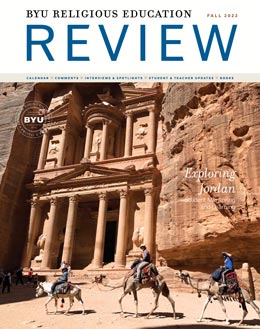Message From the Deans' Office
Enlarging the Borders of Our Knowledge
Picture a small circle with an exclamation mark in the middle. Everything you know fits inside that circle. Now picture question marks just outside the circumference of that circle. Those question marks represent the borderland between what you know and what you don’t know. Our most relevant and pressing questions at any given time reside along that border of knowledge.[1]
As we spend appropriate time standing on the edge of that circle, looking heavenward as we contemplate our most pressing questions, we are more likely to expand our knowledge in directions the Lord wants us to go. The circumference of our gospel knowledge and wisdom expands outward as we “seek learning . . . by study and also by faith” (Doctrine and Covenants 88:118). As that knowledge grows, our capacity to ask more questions at deeper and broader levels also grows. The more we expand the borders of our knowledge, the more our capacity to think, feel, and act in more Christlike ways increases.
The living prophets, scriptures, and personal revelation are divine sources of truth. We can turn to them not only for answers but also for help to know what questions to ask. Gratefully, the Lord has provided us with many additional resources for helping us expand the boundaries of our knowledge. The Religious Studies Center (RSC) has been just such a resource to me for over thirty years. The next time you visit rsc.byu.edu or pick up an RSC publication, pay attention to what happens out in the borderlands of your knowledge.
We are grateful to all who contribute in meaningful ways and to you faithful and diligent truth seekers. Thank you for your goodness and your desires not only to expand your own individual knowledge but also to be devoted disciples of Christ seeking to help enlarge our shared borders of understanding and faith.
Tyler Griffin
Associate Dean, BYU Religious Education
Notes
[1] I was first introduced to this concept by Taylor Halverson.
